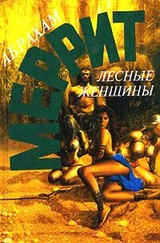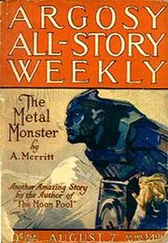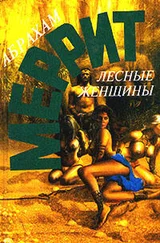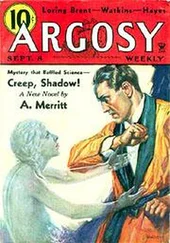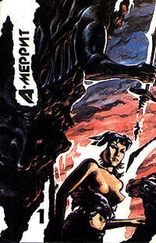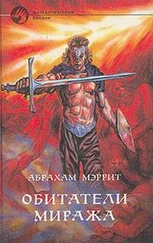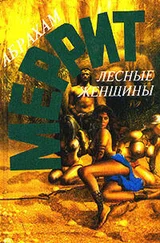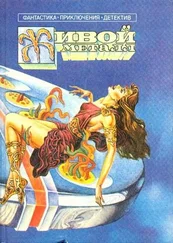He understood—this was some device of the sorcerers—the priests. A device to give them a peeping place, a listening post, within the crypt. Some knowledge of the properties of light not yet learned by the science of Kenton's own world, control of a varying vibration that made the rock transparent from within but not from without. Whatever the secret, the stone was made as porous to the aerial waves of sound as to the etheric waves of light.
Keeping his grip upon the handle, Kenton peered out between the heads and over the shoulders of those so close to and still so unconscious of him.
21
Before the Altar of Bel
THE MISTS had lifted. They had become dense lurid clouds pressing down almost upon the top of the Zoned Temple. In front of him was a huge court paved with immense octagons of black and white marble. Trooping down upon this court like a forest of faery, halting in a wide semicircle around it, were hosts of slender pillars, elfin shafts all gleaming red and black whose tapering tops were crowned with carven, lace–tipped fronds glistening like gigantic ferns wet with dew of diamonds and sapphires. Upon the black and scarlet columns shone mysterious symbolings in gold and azure, in emerald and vermilion and silver. In halted myriads these pillars reached up toward the sullen, smouldering sky.
Hardly a hundred feet away was a golden altar, guarded by crouching Kerubs, man–headed, eagle–winged, lion–bodied, carven from some midnight metal. They watched at each corner of the altar with cruel, bearded faces set between paws and as alert as though alive. From the tripod on the altar a single slender crimson flame lifted, lance tipped and motionless.
In a vast crescent, a dozen yards in the van of the columns stood a double ring of bowmen and spearmen. They held back a multitude; men and women and children pouring out of the ordered grove of pillars and milling against the soldiers like wind–driven leaves against a well. Score upon score of men and women and children plucked from their own times and set down in this timeless world.
"The new priestess—they say she is very beautiful?" One of the men in front of Kenton had spoken. He was thin, white–faced, a Phrygian cap over his lank hair. The woman was of a bold and blown comeliness, black tressed, black–eyed. The man at her right was an Assyrian, bearded, wolf visaged.
"She was a princess, they say," the woman spoke. "They say she was a princess in Babylon."
"Princess in Babylon!" echoed the Assyrian, wolf face softening, homesickness in his voice—"Oh, to be back in Babylon!"
"The Priest of Bel loves her—so they say," the woman broke the silence.
"The priestess?" whispered the Phrygian; the woman nodded. "But that is forbidden," he muttered. "It is—death!" The woman laughed again.
"Hush!" it was the Assyrian, cautioning.
"And Narada—the God's Dancer—loves the Priest of Bel!" the woman went on, unheeding. "And so—as always one must speed to Nergal!"
"Hush!" whispered the Assyrian.
There was a rumbling ruffle of drums, the sweet piping of a flute. Kenton sought the sounds. His gaze rested on half a score of temple girls. Five crouched beside little tambours upon whose heads rested their rosy thumbs; two held to red lips pierced reeds; three bent over harps. Within their circle lay what at first seemed to him a mound of shimmering spider web spun all of threads of jet, in which swarms of golden butterflies were snared. The mound quivered, lifted.
The sable silken strands had meshed a woman, a woman so lovely that for a heartbeat Kenton forgot Sharane. Dark she was, with the velvety darkness of the midsummer night; her eyes were pools of midnight skies in which shone no stars; her hair was mists of tempests snared in nets of silken gold. Sullen indeed was that gold, and in all of her something sullen that menaced the more because of its sweetness.
"There is a woman!" the bold eyes turned to the Assyrian. "She'll have what she wants—my bed on it!"
There came a voice from beside her, wistful, dreamy, worshipping:
"Ah, yes! But the new priestess—she is no woman! She is Ishtar!"
Kenton craned his neck, looking for the speaker. He saw a youth, hardly more than nineteen, saffron–robed and slight. His eyes and face were those of a beautiful dreaming child.
"He is half mad," the dark woman whispered to the Assyrian. "Ever since the new priestess came, he haunts this place."
"We are going to have a storm. The sky is like a bowl of brass," muttered the Phrygian. "The air is frightened."
The Assyrian answered:
"They say Bel comes to his house in the storm. Perhaps the priestess will not be alone tonight."
The woman laughed, slyly. Kenton felt desire to take her throat in his hands. There came a low clashing of thunder.
"Perhaps that is he, rising," said the woman, demurely.
There was a throbbing of the harp–strings, a complaining from the tambours. A dancing girl sang softly:
"Born was Nala for delight, Never danced there feet so white; Every heart on which she trod. Dying owned her heel its god; Loose her girdle day or night— Born was Nala for delight!"
The brooding eyes of Narada flashed angrily. "Be quiet!" Kenton heard her whisper. There was a ripple of laughter among the girls; the two with the pipes trilled them softly; the drums murmured. But she who had sung sat silent over her harp with downcast eyes.
The Phrygian asked: "Is this priestess then really so beautiful?"
The Assyrian said: "I do not know. No man has ever seen her unveiled." The youth whispered:
"When she walks I tremble! I tremble like the little blue lake of the temple when the breeze walks on it! Only my eyes live, and something grips my throat."
"Peace!" a brown–eyed girl with kindly face and babe in arms spoke. "Not so loud—or it will be a bow string."
"She is no woman! She is Ishtar! Ishtar!" cried the youth.
The soldiers nearby turned. Through them strode a grizzled officer, short sword in hand. Before his approach the others drew back; only the youth stood motionless. Right and left the sword carrier peered beneath bushy brows. Ere he could fix gaze on the youth a man in sailor's cap and tunic of mail had walked between the two, gripped the youth's wrist, held him hidden behind him. Kenton caught a glimpse of agate eyes, black beard―It was Zubran!
Zubran! But would he pass on? Could Kenton make him hear if he called? If his body could not be seen from without, could his voice penetrate the stone?
The sword bearer scanned the silent group, uncertainly. The Persian saluted him gravely.
"Silence here!" grunted the officer at last, and passed back among his men.
The Persian grinned; pushed the youth from him; stared at the dark woman with eyes bolder than her own. He jostled the Phrygian from his place; laid a hand upon the woman's arm.
"I was listening," he said. "Who is this priestess? I am newly come to this land and know nothing of its customs. Yet by Ormuzd!" he swore and dropped his arm around the woman's shoulders. "It was worth the journey to meet you! Who is this priestess that you say is so beautiful?"
"She is the keeper of Bel's Bower," the woman nestled close to him.
"But what does she there?" asked Zubran. "Now if it were—you—I could understand without asking. And why does she come here?"
"The priestess lives in Bel's Bower upon the top of the temple," the Assyrian spoke. "She comes here to worship at his altar. When her worship is done she returns."
"For such beauty as you say is hers," remarked Zubran, "her world seems small indeed. Why, if she is so beautiful, is she content to dwell in so small a world?"
"She is the god's," answered the Assyrian. "She is the keeper of his house. If the god entered he might be hungry. There must be food for him in his house and a woman to serve it. Or he might be amor—"
Читать дальше

![Абрахам Меррит - Лунный бассейн [Лунная заводь]](/books/20623/abraham-merrit-lunnyj-bassejn-lunnaya-zavod-thumb.webp)
